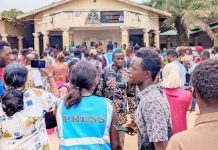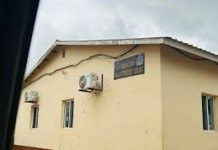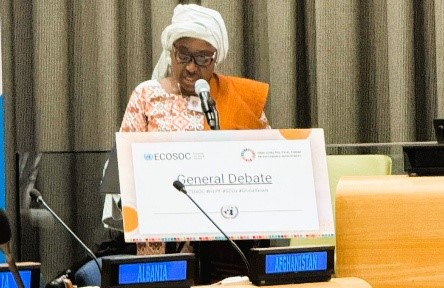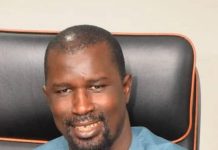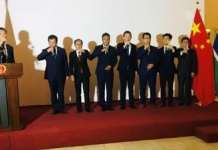The Gambian delegation is currently attending a High-level Political Forum (HLPF) in New York to presents their Voluntary National Review (VNR) reports on their progress in achieving the Sustainable Development Goals (SDGs). The meeting was from 21st -24th July, 2025. The Gambian delegation was among 39 countries including a wide range of stakeholders, government representatives, UN officials, academics, and civil society representatives.
Hon. Seedy Keita. Minister of Finance and Economic Affairs head the delegation and was accompanied by ministers of Health, Hon. Ahmed Lamin Samateh and Hon. Fatou Kinteh, and Permanent Secretary Illo Jallow of the Ministry of Gender, Children and Social Welfare respectively.
On Tuesday the 22nd July, the high-level roundtable during the High-Level Political Forum (HLPF) 2025: “Demographic Dimensions of Gender Equality and Health: Synergies for Sustainable Development.” Was co-hosted by UNFPA, Dominican Republic, Kazakhstan, Finland, The Gambia, WHO, and UNICEF.
The Minister of Gender, Children and Social Welfare, Hon. Fatou Kinteh took part in the high level roundtable, during which, The Gambian was congratulated on the launch of the Sahel Women’s Empowerment and Demographic Dividend Plus (SWEDD+), a bold initiative aimed at transforming the lives of adolescent girls and young women. Hon. Minister Kinteh was asked to provide an overview of how this project alongside other national efforts will contribute to advancing the empowerment of women and girls in The Gambia.
In her response she stated that according to the 2024 Population and Housing Census, women form 52% of the population of the Gambia, and the youth including adolescent girls are over 60% of the population. The level of vulnerability of these groups in terms of illiteracy, early marriage, other forms of harmful traditional practices and poverty cannot be over emphasized.
“All forms of support to these groups for their overall empowerment is of paramount importance to ensure sustained socio-economic development of The Gambia. The Gambia is one of the beneficiary countries of the SWEDD+ project. Thanks, and appreciation to the World Bank for the support,” she stated.
The project will promote and ensure birth registration as well as the registration of marriages; this will promote the delay of marriages until age 18, thus preventing early marriages. It will enable girls to complete high school and engage in TEVET or university education before marriage. This will create employability, subsequently leading to their economic empowerment.
She noted that through the creation of safe spaces, 52,000 adolescent girls will be provided with information on sexual and reproductive health, and a livelihood skill of their choice to ensure their employability.
She emphasised that continuity and completion of secondary education by all girls, especially those who are vulnerable will be provided with the necessary support for inclusivity leaving no one behind. It is for this reason that a school re – entry programme is being supported by the SWEDD+ project to give a second chance to girls who drop out of school for one reason or the other; Adolescent girls who are in and out of school and young women between the ages of 15 to 24 will be supported through livelihood skills training, entrepreneurship training and provision of grants to run a micro enterprise activity of their choice.
Hon. Kinteh said economic empowerment will be utilized as a strategy to reduce infant and maternal mortality. A comprehensive gender based violence programme will be implemented through training and awareness creation and service delivery.
The design of a comprehensive Social and Behaviour Change Communication programme is at an advanced stage for social norm change; for the acceptance and ownership of the project by all, more especially the communities. She said economic empowerment for women is synonymous to economic independence, poverty alleviation and wealth creation, improvement in the status of women is equals to improvement in the welfare of families, better accommodation, better health, better education more so for the girl child, development for communities and the country.
She affirms that the SWEDD+ PROJECT is complementing the efforts of the government of The Gambia in achieving the goals of our National Development Plan 2023 – 2027, and SDGs 3 on Health and 5 Gender Equality, in education and skills training, health information and service provision and economic empowerment.
The project has encouraged the multisectoral approach to programming. The ministries of Gender, Children and Social Welfare, Health, Youths and Sports, Justice and Finance are involved in the implementation; this ensures partnerships; SDG Goal 17.
She pointed out that key challenges remain on SDG 3: (High maternal mortality) 289 deaths per 100,000 live births reduced from 433 in 2013, Limited capacity to manage cancers, Limited Resources, Limited medical Equipment, High Attrition Rate of trained personnel, 49% of our villages are under primary care government is making efforts to increase this to 100%, Socio Cultural Beliefs and Practices, Mental health is also an issue ( due to substance abuse),The burden of communicable and non communicable diseases and Low compliance to drugs and Low awareness of women and SDG 5: (High Illiteracy) among women, High level of poverty among women, Low level of women in top decision making positions (Cabinet and National Assembly), Patriarchy, Adherent to traditional norms and values, Limited Financial Resources for programming, Women’s limited access to micro credit, Land ownership very limited due to customary tenure and Gender Based Violence
She said The Gambia is aware of these challenges and has therefore initiated innovative approaches and strategies to address them. The SWEDD+ is also complimenting the efforts of The Gambia in addressing some of these challenges.









